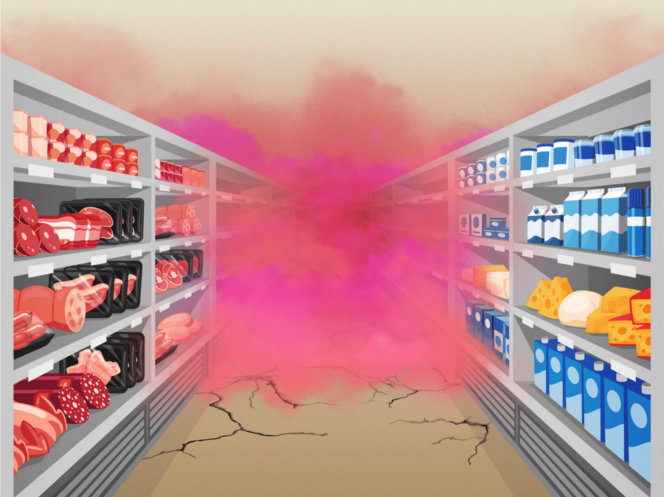“Clean Up on Aisle 3”: The methane mess supermarkets are hiding

Executive Summary
The rate of global heating is pushing natural systems toward dangerous tipping points. Methane is 80 times more potent than carbon dioxide, but its shorter lifespan means cutting emissions now can rapidly slow warming. It’s the emergency lever we must pull to avert climate breakdown and nature loss.
Methane is responsible for about 0.5°C of heating today and contributes to 25% of the heating the planet has already experienced. While agriculture as a whole is the largest source of human-caused methane emissions, animal agriculture alone accounts for approximately 60% of these emissions.
Food retailers – or supermarkets – are where most people purchase food and interact with the meat and dairy supply chain, putting them in a unique position to drive emissions reductions. Yet, reporting and action on methane remain a worrying blind spot, despite meat and dairy accounting for an estimated third of their total emissions.
Our research reveals that none of the 20 top-grossing retailers in the US and Europe – including household names Ahold Delhaize, Carrefour, Lidl, Tesco, and Walmart – report on their methane emissions or have set methane emissions reduction targets. While many retailers make bold statements about their climate plans, the focus is often on Scope 1 and 2 (direct) emissions reductions, however these only represent approximately 7% of retailers total emissions.
There appears to be a disconnect between retailers’ climate promises and action – while nine of the largest food retailers have committed to achieving net zero by 2050, these are just empty words when meat and dairy emissions remain a blindspot. 19 out of the 20 food retailers included in this scorecard secured less than 50% of the total points available, with Tesco being the only exception at 51%. US retailers performed especially badly, displaying a stark lack of climate accountability and ambition from their European counterparts.
While eleven of the supermarkets acknowledged that emissions from animal agriculture significantly drive climate change and many suggest increasing plant-based sales could help, they typically fail to implement specific, measurable actions to address their role in the problem.
The food retailers named in our report have the solutions and know what action needs to be taken, but are not moving fast enough despite the effects of climate change already being felt. Retailers must urgently deliver climate action as a top priority by setting targets to reduce their methane emissions and reporting transparently on these.
For retailer climate plans to be credible, they must adhere to science and set methane reduction targets of at least 30% by 2030 (from a 2020 baseline), backed by a comprehensive plan for the entire value chain. By increasing and promoting their plant-based* offering working towards a target of 60% against 40% animal based protein by 2030, food retailers can enable a rapid shift to more sustainable and healthy diets.
* The term ‘plant-based proteins’ includes wholefood and vegetable proteins as well as meat and dairy substitutes.
You might also like...

Hot Money: 40 Financial Institutions are funding a climate-changing agri-methane footprint
This report focuses on the 20 investors and 20 banks that are funding the methane generating activities of 15 of the leading meat and dairy companies worldwide. Collectively these financial institutions fu...

High Steaks: Taking methane from animal farming out of its blindspot
Methane emissions in the EU’s livestock sector are expected to drop by a mere 3.7% by 2030 with current policies, which means that the EU will not achieve its 30% commitments under the Global Methane Pledge.

Biogas Policies in the EU: Levelling up or locking in?
Commissioned by the Methane Matters Coalition, this report examines the current status of the biogas industry in the European Union, along with 7 country case studies.